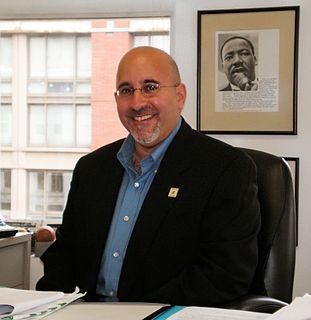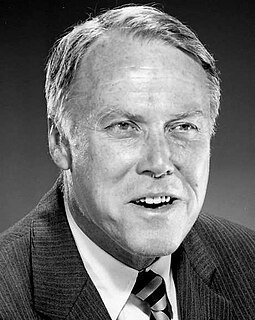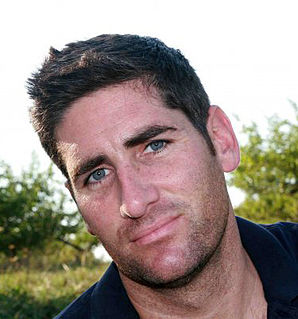
David Boies is an American lawyer and chairman of the law firm Boies Schiller Flexner LLP. Boies rose to national prominence for three major cases: leading the U.S. federal government's successful prosecution of Microsoft in United States v. Microsoft Corp., his unsuccessful representation of Democratic presidential candidate Al Gore in Bush v. Gore, and for successful representation of the plaintiff in Hollingsworth v. Perry, which invalidated California Proposition 8 banning same-sex marriage. Boies has also represented various clients in US lawsuits, including Theranos, tobacco companies, Harvey Weinstein, and Jeffrey Epstein's victims including Virginia Roberts Giuffre.
Boy Scouts of America et al. v. Dale, 530 U.S. 640 (2000), was a landmark decision of the US Supreme Court, decided on June 28, 2000, that held that the constitutional right to freedom of association allowed the Boy Scouts of America (BSA) to exclude a homosexual person from membership in spite of a state law requiring equal treatment of homosexuals in public accommodations. More generally, the court ruled that a private organization such as the BSA may exclude a person from membership when "the presence of that person affects in a significant way the group's ability to advocate public or private viewpoints". In a five to four decision, the Supreme Court ruled that opposition to homosexuality is part of BSA's "expressive message" and that allowing homosexuals as adult leaders would interfere with that message.
Liberty Counsel is a 501(c)(3) tax-exempt religious liberty organization that engages in litigation related to evangelical Christian values. Liberty Counsel was founded in 1989 by its chairman Mathew Staver and its president Anita L. Staver, who are attorneys and married to each other. The Southern Poverty Law Center has listed Liberty Counsel as an anti-LGBT hate group, a designation the group has disputed. The group is a Christian ministry.

LGBT rights opposition indicates the opposition to legal rights, proposed or enacted, for lesbian, gay, bisexual, and transgender (LGBT) people. Laws that LGBT rights opponents may be opposed to include civil unions or partnerships, LGBT parenting and adoption, military service, access to assisted reproductive technology, and access to sex reassignment surgery and hormone replacement therapy for transgender individuals.

Evan Wolfson is an attorney and gay rights advocate. He is the founder of Freedom to Marry, a group favoring same-sex marriage in the United States, serving as president until its 2015 victory and subsequent wind-down. Wolfson authored the book Why Marriage Matters: America, Equality, and Gay People's Right to Marry, which Time Out New York magazine called, "Perhaps the most important gay-marriage primer ever written". He was listed as one of Time magazine's 100 most influential people in the world. He has taught as an adjunct professor at Columbia Law School, Rutgers Law School, and Whittier Law School and argued before the Supreme Court in Boy Scouts of America v. Dale. He now teaches law and social change at Georgetown Law School and at Yale University; serves as a senior counsel at Dentons, the world's largest law firm; and primarily provides advice and assistance to other organizations and causes, in the United States and globally, that are seeking to adapt the lessons on "how to win" from the same-sex marriage movement.

The Bertrand Russell Case, known officially as Kay v. Board of Higher Education, was a case concerning the appointment of Bertrand Russell as Professor of Philosophy of the College of the City of New York, as well as a collection of articles on the aforementioned case, edited by John Dewey and Horace M. Kallen.

John Edward Jones III is the 30th President at Dickinson College and a former United States District Judge of the United States District Court for the Middle District of Pennsylvania. He is best known for his presiding role in the landmark Kitzmiller v. Dover Area School District case, in which the teaching of "intelligent design" in public school science classes was ruled to be unconstitutional. In 2014, he ruled that Pennsylvania's 1996 ban on same-sex marriage was unconstitutional. On May 14, 2021 it was announced that Judge Jones would serve as interim president of his alma mater Dickinson College for a two-year period beginning July 1, 2021. On February 28, 2022 President Jones was named the 30th President of Dickinson College.

Porter Hinman Dale was a member of both the United States House of Representatives and later the United States Senate from Vermont.
Kenji Yoshino is a legal scholar and the Chief Justice Earl Warren Professor of Constitutional Law at New York University School of Law. Formerly, he was the Guido Calabresi Professor of Law at Yale Law School. His work involves constitutional law, anti-discrimination law, civil and human rights, as well as law and literature, and Japanese law and society.

Marvin Ray Baxter is a former Associate Justice of the Supreme Court of California who served from January 1991 to January 5, 2015.
The Marriage Law Project (MLP) is a public interest legal aid organization founded in 1996. It aims "to reaffirm marriage as the union of one man and one woman." Its offices are located in the Columbus School of Law at The Catholic University of America in Washington, D.C. Its founder, David Orgon Coolidge, was Senior Fellow at the Columbus School of Law Ethics and Public Policy Center and a Research Fellow in the Columbus School of Law Interdisciplinary Program in Law and Religion. William C. Duncan, J.D. is Assistant Director of the Marriage Law Project.

In the United States, freedom of religion is a constitutionally protected right provided in the religion clauses of the First Amendment. Freedom of religion is closely associated with separation of church and state, a concept advocated by Colonial founders such as Dr. John Clarke, Roger Williams, William Penn, and later Founding Fathers such as James Madison and Thomas Jefferson.

Ballot Measure 2 of 1998 is a ballot measure, since ruled unconstitutional, that added an amendment to the Alaska Constitution that prohibited the recognition of same-sex marriage in Alaska. The Ballot measure was sparked by the lawsuit filed by Jay Brause and Gene Dugan, after the two men were denied a marriage license by the Alaska Bureau of Vital Statistics. In Brause v. Bureau of Vital Statistics, 1998 WL 88743, the Alaska Superior Court ruled that the state needed compelling reason to deny marriage licenses to same-sex couples and ordered a trial on the question. In response, the Alaska Legislature immediately proposed and passed Resolution 42, which became what is now known as Ballot Measure 2. Ballot Measure 2 passed via public referendum on November 3, 1998, with 68% of voters supporting and 32% opposing. The Bause case was dismissed following the passage of the ballot measure.
Andrew Koppelman is the John Paul Stevens Professor of Law and professor of political science at Northwestern University. He is the recipient of the 2015 Walder Award for Research Excellence. The main focus of his research is on the intersection of law and political philosophy.
Richard G. Wilkins was an American lawyer and proponent of a socially conservative view of marriage and the family. He was the Robert W. Barker Professor of Law at the J. Reuben Clark Law School which is part of Brigham Young University (BYU) until his retirement. He also served as the director of the World Family Policy Center at BYU which was affiliated with the Clark Law School and the David M. Kennedy Center for International Studies. He was an assistant to the solicitor general of the United States in the 1980s.

John Thomas Noonan Jr. was a United States Circuit Judge of the United States Court of Appeals for the Ninth Circuit.
Alan J. Hawkins is a professor in the Brigham Young University (BYU) School of Family Life, a division of the university's College of Home Family and Social Sciences. He is the Camilla E. Kimball professor of family life at BYU.

James Dale is an American gay rights activist. He is best known for his role in Boy Scouts of America v. Dale, the landmark US Supreme Court case that challenged the Boy Scouts of America (BSA) policy of excluding homosexuals from being scout leaders.
Peter Zuckerman is an American journalist and author who has focused his career in court reporting, investigative journalism, and adventure stories. He is also a leader of several prominent progressive political campaigns.

Scout's Honor is a 2001 American documentary film directed by Tom Shepard and written by Meg Moritz. Appearing as themselves in the documentary are Steven Cozza, James Dale, Tim Curran, Dave Rice and Scott and Jeanette Cozza. The film examines the Boy Scouts of Americas (BSA) policy against gays in the organization. It focuses on Steve Cozza and Dave Rice who join together to fight against the policy, and also relates the stories of two gay men who were expelled from the organization, and fought back in the courts. The film premiered at the Sundance Film Festival on January 25, 2001, where it won an Audience Award for Best Documentary, and director Tom Shepard won a Freedom of Expression Award. The documentary had additional screenings at several other film festivals where it received multiple awards, and it also received a GLAAD Media Award for Outstanding Documentary. The film aired nationally on the PBS series POV on June 19, 2001.